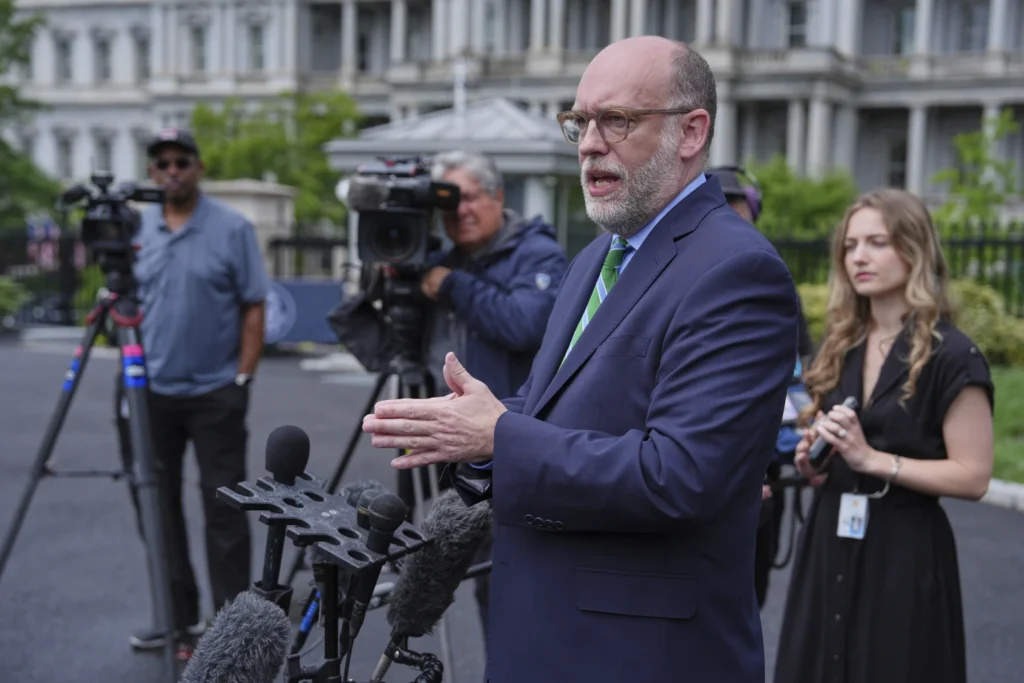The White House on Tuesday formally requested that Congress rescind $9.4 billion in already approved federal spending, launching a controversial bid to cut funding from a range of programs including global aid, public broadcasting, and progressive initiatives championed for elimination by Elon Musk’s Department of Government Efficiency (DOGE).
Known as a “rescission,” the move requires Congressional approval to reverse previously authorized expenditures. If passed, the request would institutionalize many of the budget cuts and freezes identified by DOGE, which has become a key driver of fiscal reform under President Donald Trump’s second-term administration.
White House budget director Russ Vought, who unveiled the plan, signaled that more rescissions could follow:
“We are certainly willing and able to send up additional packages if the congressional will is there,” he said.
Targeting Foreign Aid and Cultural Programs
Of the $9.4 billion proposed for clawback, $8.3 billion would be taken from the State Department and the U.S. Agency for International Development (USAID). Other targeted areas include federal support for National Public Radio (NPR), the Public Broadcasting Service (PBS), and the President’s Emergency Plan for AIDS Relief (PEPFAR).
In a background briefing, an anonymous official from the Office of Management and Budget identified several specific line items the Trump administration considers wasteful. These include:
-
$750,000 for a program aimed at reducing xenophobia in Venezuela
-
$67,000 for a nutritional pilot project feeding insect powder to children in Madagascar
-
$3 million for sexual health programs in Zambia, including circumcisions, vasectomies, and condom distribution
The White House argues these cuts reflect an effort to strip funding from “liberal ideological experiments” and redirect taxpayer money toward “essential national interests.”
Mixed Response on Capitol Hill
House Speaker Mike Johnson (R-La.) praised the rescissions package, vowing swift legislative action:
“This package reflects many of DOGE’s findings and is one of the many legislative tools Republicans are using to restore fiscal sanity.”
The House Freedom Caucus also threw its weight behind the proposal, calling for additional rounds of rescissions to further shrink federal spending.
However, opposition is mounting in the Senate, where key figures have expressed concern about the broader consequences. Sen. Susan Collins (R-Maine), chair of the Senate Appropriations Committee, said the Senate would scrutinize the impact on national security, public health, and rural emergency communications.
“Despite this fast track, the Senate Appropriations Committee will carefully review the rescissions package and examine the potential consequences,” Collins said.
Limited Impact on National Debt
Although the rescissions package is symbolically aligned with Trump’s cost-cutting agenda, analysts say it will barely dent the soaring national debt. The U.S. government is projected to spend $7 trillion this fiscal year, making the $9.4 billion rescission equivalent to just 0.1% of total expenditures.
White House Press Secretary Karoline Leavitt defended the initiative, highlighting Vought’s reputation as a “fiscal hawk” and hinting at future measures to return even more funds.
“He has tools at his disposal to produce even more savings,” she told reporters.
Legal Gray Areas and Constitutional Tensions
The rescission request is part of a legal process established by the 1974 Impoundment Control Act, which mandates that Congress be notified if the executive branch intends to withhold appropriated funds. While Congress typically has 45 days to respond, Vought suggested that delaying action until the end of the fiscal year in September could allow the administration to sidestep a vote, letting the funds expire.
Some legal experts argue that this maneuver borders on unconstitutional impoundment. Bobby Kogan of the Center for American Progress called the administration’s tactics “illegal,” asserting that withholding funds without explicit congressional approval violates federal law.
Vought pushed back during a CNN interview over the weekend, claiming the administration’s interpretation of the law simply differs from that of its critics.
“We’re not breaking the law,” he said. “Every part of the federal government, each branch, has to look at the Constitution themselves and uphold it.”
As debates intensify in Congress, the rescissions package is shaping up to be a flashpoint in the broader ideological battle over the size, scope, and purpose of federal spending under President Trump’s renewed vision for “America First” governance.



